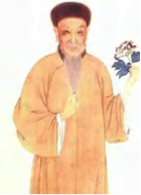 Yuán Méi was an 18th century Chinese poet, artist and expert in gastronomy who lived during the Qing Dynasty. It was originally thought that he would have a career as a civil servant but he tried that, and then gave it up, preferring instead to follow his literary ambitions.
Yuán Méi was an 18th century Chinese poet, artist and expert in gastronomy who lived during the Qing Dynasty. It was originally thought that he would have a career as a civil servant but he tried that, and then gave it up, preferring instead to follow his literary ambitions.
He was born sometime during the year 1716 in Qiantang, a place which is now known as Hangzhou, in the Zhejiang province. He grew up in comfortable circumstances as part of a cultured family and was well educated. His family hoped that he would have a career in public life and he passed the jinshi imperial examinations in 1739 which allowed him to enter the Hanlin Academy. Three years later he was a serving magistrate in Jiangsu province but he resigned his post after six years and returned home to concentrate on literary matters.
Yuán became an occasional writer on the subject of food and he also produced treatises to help others pass the imperial examinations. He is, however, more famous as a poet and essayist. He had a deep interest in the supernatural and Chan Buddhism, rejecting the more traditional thinking of institutional Buddhism and Daoism. He wrote in an “unusually clear and elegant language”, stressing his own feelings and constructing technically perfect verse. One of his collected works was called Suiyuan shihua and, afterwards, students of this collection referred to Yuán as “Mister Suiyuan”.
It is clear that his writing was inspired by his extensive travels in southern China, especially in the mountainous regions such as Wuyi and Guilin. He kept detailed notes of all of his mountain explorations and these can be found in a book called You Guilin zhu shan ji, which translates to Record of tours of the mountains of Guilin. He also made the time to pass on his knowledge and skill to students of literature, especially female ones. He was a great admirer of women writers and helped many to publish work under their own names at a time when it was unusual to find published work by women in China.
As a poet Yuán was considered to be a master of the classic Chinese tradition, using classical forms in his writing but ensuring that he used language that made his poems accessible to ordinary people. He did not see poetry as elitist and strove to bring his work to as many readers as possible. Thus he would often portray the natural world and everyday life experiences in his work, allowing everyone to understand the meaning as easily as possible.
A good example of his simple observations of something as common as weather can be seen in his short poem Rain Passes which is reproduced here:

Yuán also became a celebrated gastronome and he has been compared to French food experts such as Jean Anthelme Brillat-Savarin who lived around the same time. It had become a tradition, amongst those who could afford it, to mount exotic displays of food, designed to display their wealth rather than their appreciation of gastronomy. Yuán set out to change things to a much simpler style and he preached this mantra to Chinese cooks. In his cookery manual, published in 1792 under the title Suiyuan Shidan, he wrote:

His views on food production were reflected in his life. He preferred to live simply, although many would regard his lifestyle as one lived by an unconventional libertine. He certainly lived a long life without too much stress or worry.
Yuán Méi died in 1797 at the age of 79.

